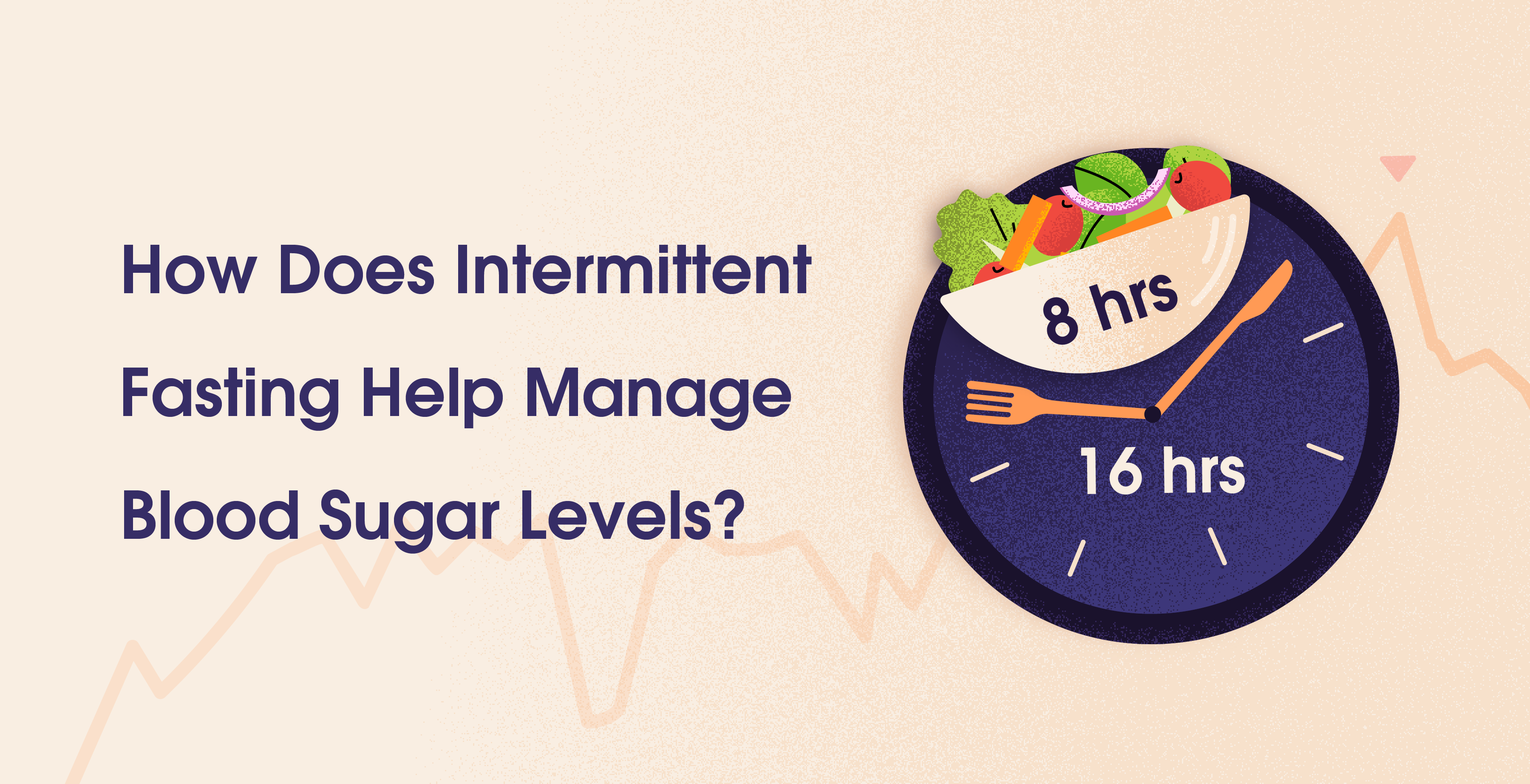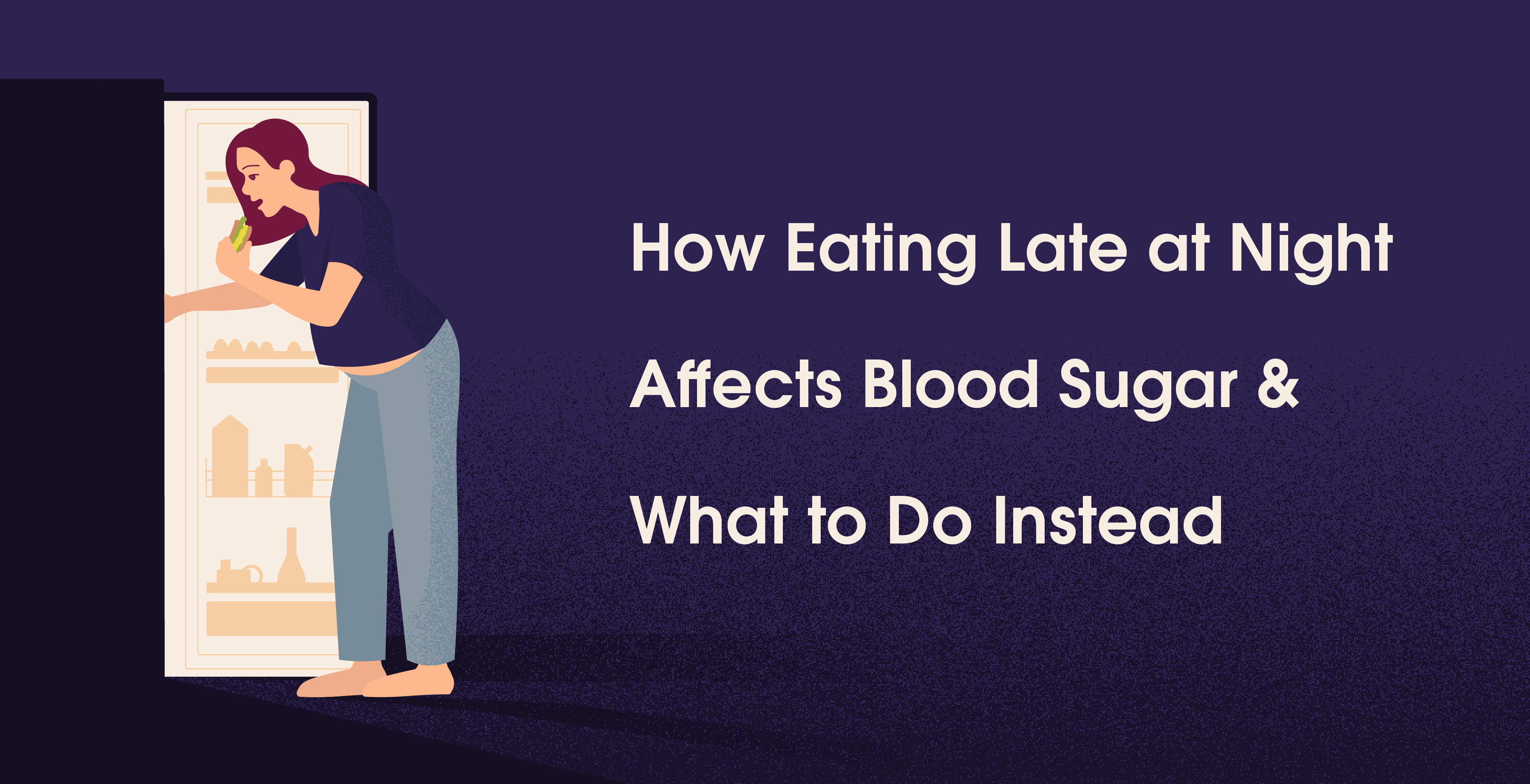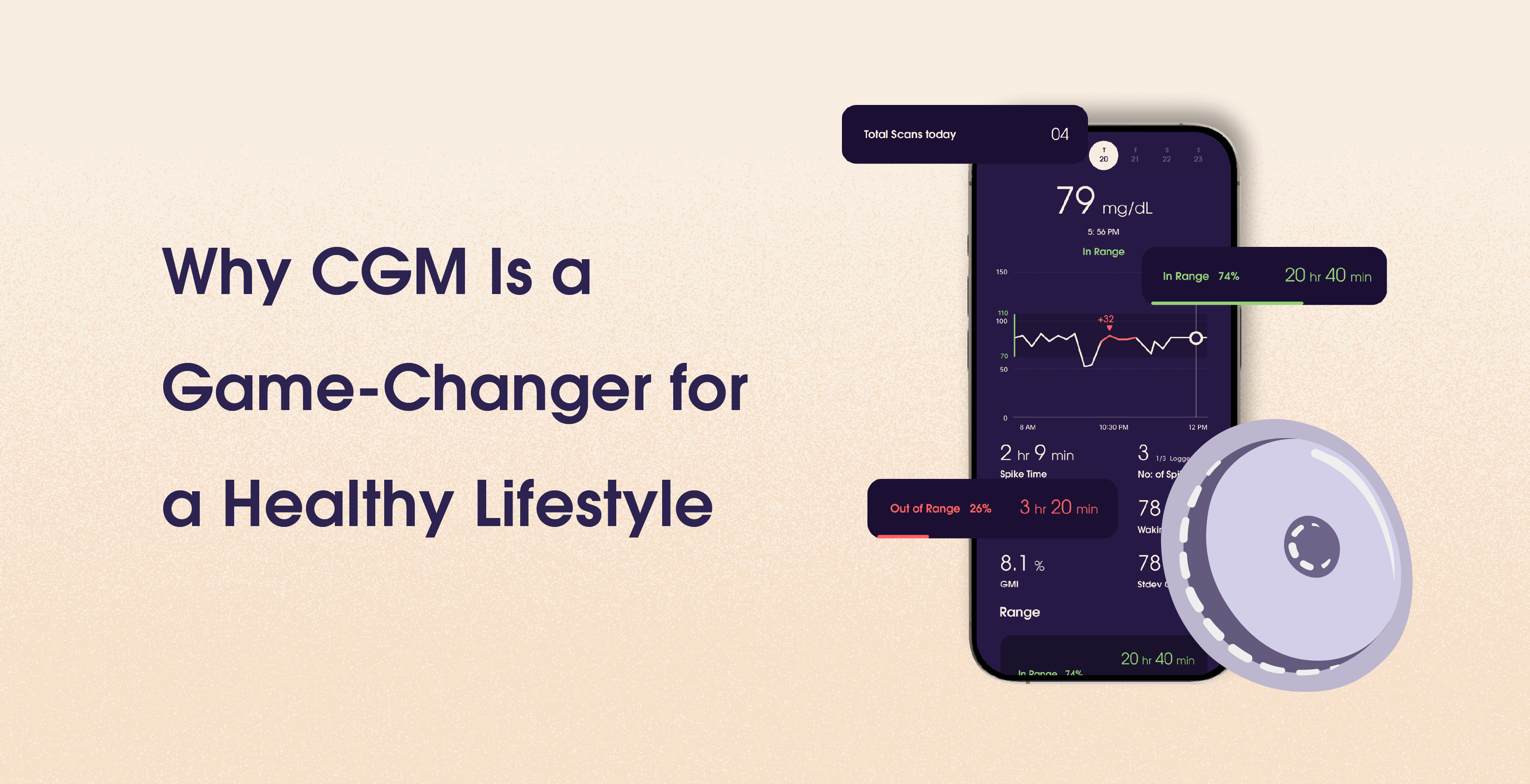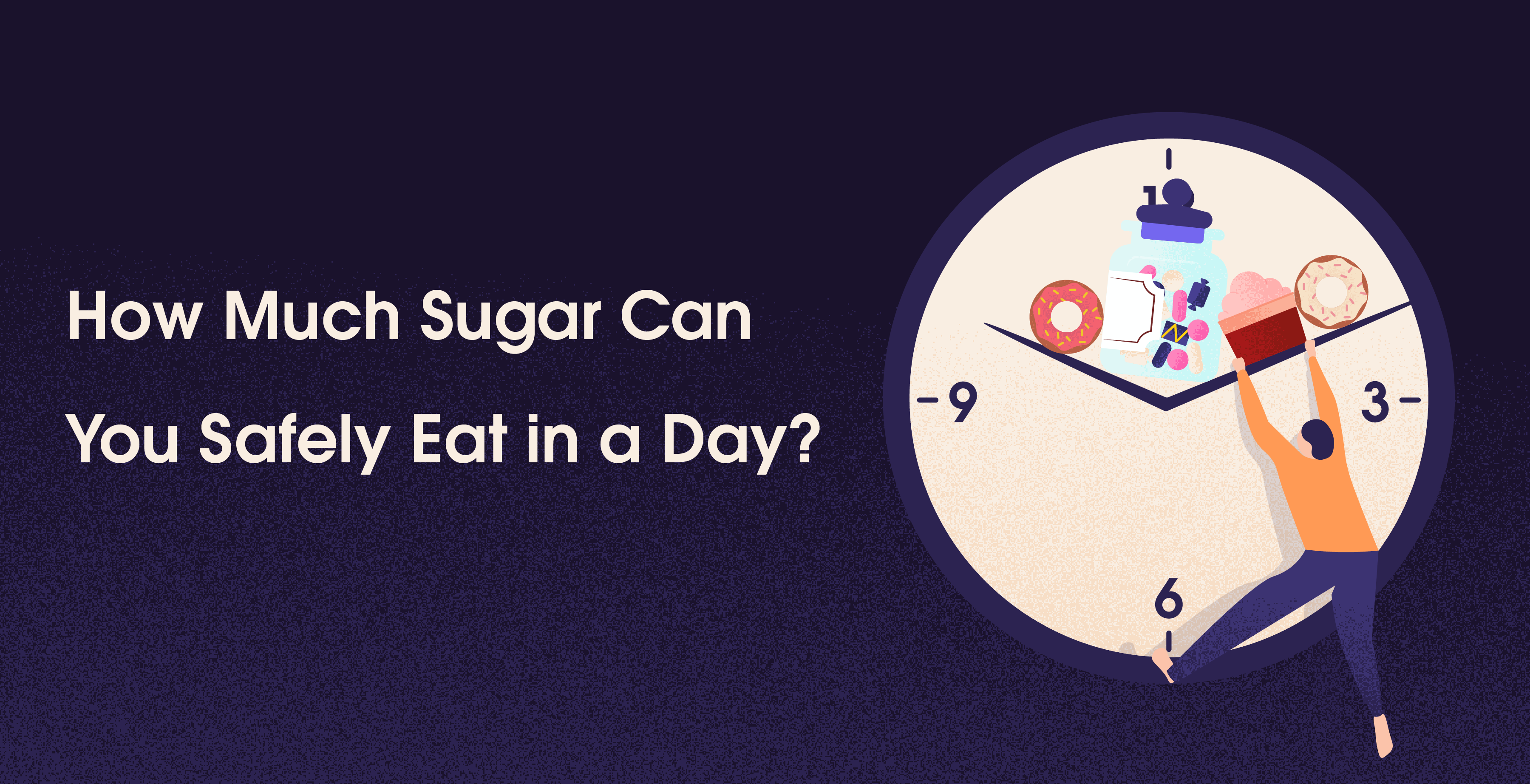How Does Intermittent Fasting Help Manage Blood Sugar Levels?
Feb 27, 2025
Sayfali Rawlani



Table Of Contents
Intermittent fasting (IF) isn’t just another wellness trend that’ll fade out faster than a new-year gym membership. It’s been around for centuries, woven into cultures, traditions, and survival instincts. And when it comes to blood sugar management, it’s like a backstage crew that keeps the whole show running smoothly—quietly tweaking, adjusting, and balancing behind the scenes.
If you’re hearing about IF from a fitness junkie or a social media influencer, it probably sounds like magic. Skip breakfast, eat in a six-hour window, and suddenly, your body transforms into a metabolic powerhouse? Not exactly. There’s some legit science to it, but more importantly, there’s a rhythm, a way your body responds that makes all the difference.
Highlights
Intermittent fasting (IF) isn’t just a trend; it has been part of cultures and traditions for centuries.
Constant snacking and refined carbs cause frequent insulin spikes, leading to insulin resistance over time.
Fasting gives the body a break, helping insulin levels drop and allowing cells to become more sensitive to it.
IF helps lower fasting blood sugar levels by encouraging the body to use stored glycogen for energy.
Eating in a smaller window reduces overeating, preventing frequent sugar spikes and crashes.
Fasting encourages fat-burning, reducing dependence on glucose for energy.
Not everyone responds well to fasting; those prone to dizziness or irritability should be cautious.
People with diabetes or on medication should monitor their blood sugar closely if attempting fasting.
Common IF schedules include 16:8, 18:6, 5:2, and OMAD (one meal a day).
Fasting is a useful tool, but what you eat in your eating window matters just as much as when you eat.
The best approach to fasting is listening to your body and adjusting based on how you feel.
Sugar Spikes and Crashes
Think of your blood sugar like a hyperactive kid at a birthday party—one minute they’re bouncing off the walls (hello, sugar spike!), the next, they’re crashing into a post-cake coma. That’s what happens when you’re constantly snacking or consuming refined carbs. Your pancreas goes into overdrive, churning out insulin to shuttle glucose where it needs to go. Over time, if this cycle repeats too often, your cells get tired of insulin’s constant knocking. Enter: insulin resistance. And that’s when things get messy—energy dips, weight gain, and a higher risk of diabetes start creeping in.
Intermittent fasting helps by giving your body a break. When you’re not constantly eating, your insulin levels stay low, and your cells get a chance to reset. Instead of constantly reacting to incoming food, your body learns to tap into stored energy—namely, fat. And that shift? It’s a game-changer for blood sugar balance.
How Fasting Keeps Blood Sugar in Check
Alright, so what’s actually happening under the hood? Why does fasting seem to work like a charm for some people?
Improved Insulin Sensitivity
When you fast, your body gets a break from the constant insulin spikes. Over time, your cells become more responsive to insulin again, meaning your body doesn’t need to produce as much to get the job done. That’s a big win for blood sugar stability.
Lower Fasting Blood Sugar Levels
Studies show that IF can help lower fasting glucose levels. Without food coming in every few hours, your body starts using stored glycogen for energy. As your glycogen stores deplete, your blood sugar remains steady instead of fluctuating wildly.
Less Overeating, Fewer Sugar Crashes
Have you ever noticed how eating all day can make you feel… hungrier? It’s like a vicious cycle—eat, spike, crash, crave, repeat. But when you condense your eating into a smaller window, you naturally eat less (and usually, better). That means fewer spikes, fewer crashes, and more stable energy levels.
Tapping Into Fat for Fuel
Once your body realizes it’s not getting a steady stream of glucose, it starts burning fat for energy. This metabolic switch doesn’t just help with weight loss—it also helps regulate blood sugar because your body isn’t so dependent on quick sugar hits to function.
But Is It for Everyone?
Here’s the thing—what works for one person might not work for another. IF isn’t a one-size-fits-all solution. Some people thrive on it, feeling sharper, lighter, and more in control of their hunger. Others? Not so much. If you’re someone who gets dizzy, shaky, or downright irritable when you skip meals, fasting might not be your jam.
And for folks dealing with diabetes, especially those on medication, fasting should be approached with a little extra caution. Since it can lower blood sugar levels, it’s crucial to monitor how your body responds and work with a doctor to tweak things if necessary.
Finding Your Fasting Flow
If you’re curious about giving it a shot, start slow. Maybe skip late-night snacking or push breakfast back an hour. See how you feel. Some popular fasting schedules include:
16:8 (Fast for 16 hours, eat in an 8-hour window—probably the most common.)
18:6 (A slightly longer fast, with a 6-hour eating window.)
5:2 (Eat normally five days a week, but cut down on calories for two non-consecutive days.)
OMAD (One Meal a Day) (Yep, exactly what it sounds like—eating all your daily calories in a single meal.)
The key? Listen to your body. If fasting makes you feel great, roll with it. If it makes you miserable, maybe it’s not your thing. No one diet, hack, or lifestyle shift works for everyone.
Final Thoughts
Intermittent fasting isn’t a magic bullet, but it’s a solid tool in the blood sugar management toolkit. It gives your body space to recalibrate, improves insulin sensitivity, and helps stabilize glucose levels without needing to micromanage every meal.
But remember—fasting is just one piece of the puzzle. What you eat when you do eat? That matters too. A diet full of whole, nutrient-dense foods will do way more for your blood sugar than simply restricting when you eat but still loading up on junk.
So, if you’re thinking about trying IF, ease into it. Experiment. See what works. And most importantly? Pay attention to how you feel. Because the best diet, the best lifestyle, the best approach to health—is the one that works for you.
References
Intermittent fasting (IF) isn’t just another wellness trend that’ll fade out faster than a new-year gym membership. It’s been around for centuries, woven into cultures, traditions, and survival instincts. And when it comes to blood sugar management, it’s like a backstage crew that keeps the whole show running smoothly—quietly tweaking, adjusting, and balancing behind the scenes.
If you’re hearing about IF from a fitness junkie or a social media influencer, it probably sounds like magic. Skip breakfast, eat in a six-hour window, and suddenly, your body transforms into a metabolic powerhouse? Not exactly. There’s some legit science to it, but more importantly, there’s a rhythm, a way your body responds that makes all the difference.
Highlights
Intermittent fasting (IF) isn’t just a trend; it has been part of cultures and traditions for centuries.
Constant snacking and refined carbs cause frequent insulin spikes, leading to insulin resistance over time.
Fasting gives the body a break, helping insulin levels drop and allowing cells to become more sensitive to it.
IF helps lower fasting blood sugar levels by encouraging the body to use stored glycogen for energy.
Eating in a smaller window reduces overeating, preventing frequent sugar spikes and crashes.
Fasting encourages fat-burning, reducing dependence on glucose for energy.
Not everyone responds well to fasting; those prone to dizziness or irritability should be cautious.
People with diabetes or on medication should monitor their blood sugar closely if attempting fasting.
Common IF schedules include 16:8, 18:6, 5:2, and OMAD (one meal a day).
Fasting is a useful tool, but what you eat in your eating window matters just as much as when you eat.
The best approach to fasting is listening to your body and adjusting based on how you feel.
Sugar Spikes and Crashes
Think of your blood sugar like a hyperactive kid at a birthday party—one minute they’re bouncing off the walls (hello, sugar spike!), the next, they’re crashing into a post-cake coma. That’s what happens when you’re constantly snacking or consuming refined carbs. Your pancreas goes into overdrive, churning out insulin to shuttle glucose where it needs to go. Over time, if this cycle repeats too often, your cells get tired of insulin’s constant knocking. Enter: insulin resistance. And that’s when things get messy—energy dips, weight gain, and a higher risk of diabetes start creeping in.
Intermittent fasting helps by giving your body a break. When you’re not constantly eating, your insulin levels stay low, and your cells get a chance to reset. Instead of constantly reacting to incoming food, your body learns to tap into stored energy—namely, fat. And that shift? It’s a game-changer for blood sugar balance.
How Fasting Keeps Blood Sugar in Check
Alright, so what’s actually happening under the hood? Why does fasting seem to work like a charm for some people?
Improved Insulin Sensitivity
When you fast, your body gets a break from the constant insulin spikes. Over time, your cells become more responsive to insulin again, meaning your body doesn’t need to produce as much to get the job done. That’s a big win for blood sugar stability.
Lower Fasting Blood Sugar Levels
Studies show that IF can help lower fasting glucose levels. Without food coming in every few hours, your body starts using stored glycogen for energy. As your glycogen stores deplete, your blood sugar remains steady instead of fluctuating wildly.
Less Overeating, Fewer Sugar Crashes
Have you ever noticed how eating all day can make you feel… hungrier? It’s like a vicious cycle—eat, spike, crash, crave, repeat. But when you condense your eating into a smaller window, you naturally eat less (and usually, better). That means fewer spikes, fewer crashes, and more stable energy levels.
Tapping Into Fat for Fuel
Once your body realizes it’s not getting a steady stream of glucose, it starts burning fat for energy. This metabolic switch doesn’t just help with weight loss—it also helps regulate blood sugar because your body isn’t so dependent on quick sugar hits to function.
But Is It for Everyone?
Here’s the thing—what works for one person might not work for another. IF isn’t a one-size-fits-all solution. Some people thrive on it, feeling sharper, lighter, and more in control of their hunger. Others? Not so much. If you’re someone who gets dizzy, shaky, or downright irritable when you skip meals, fasting might not be your jam.
And for folks dealing with diabetes, especially those on medication, fasting should be approached with a little extra caution. Since it can lower blood sugar levels, it’s crucial to monitor how your body responds and work with a doctor to tweak things if necessary.
Finding Your Fasting Flow
If you’re curious about giving it a shot, start slow. Maybe skip late-night snacking or push breakfast back an hour. See how you feel. Some popular fasting schedules include:
16:8 (Fast for 16 hours, eat in an 8-hour window—probably the most common.)
18:6 (A slightly longer fast, with a 6-hour eating window.)
5:2 (Eat normally five days a week, but cut down on calories for two non-consecutive days.)
OMAD (One Meal a Day) (Yep, exactly what it sounds like—eating all your daily calories in a single meal.)
The key? Listen to your body. If fasting makes you feel great, roll with it. If it makes you miserable, maybe it’s not your thing. No one diet, hack, or lifestyle shift works for everyone.
Final Thoughts
Intermittent fasting isn’t a magic bullet, but it’s a solid tool in the blood sugar management toolkit. It gives your body space to recalibrate, improves insulin sensitivity, and helps stabilize glucose levels without needing to micromanage every meal.
But remember—fasting is just one piece of the puzzle. What you eat when you do eat? That matters too. A diet full of whole, nutrient-dense foods will do way more for your blood sugar than simply restricting when you eat but still loading up on junk.
So, if you’re thinking about trying IF, ease into it. Experiment. See what works. And most importantly? Pay attention to how you feel. Because the best diet, the best lifestyle, the best approach to health—is the one that works for you.
References
Table Of Contents
Table Of Contents
Table Of Contents
Read More


Mar 25, 2025
Sayfali Rawlani


Mar 20, 2025
Sayfali Rawlani


Mar 6, 2025
Sayfali Rawlani



Company
Copyright © 2025 trst health. All right reserved.

